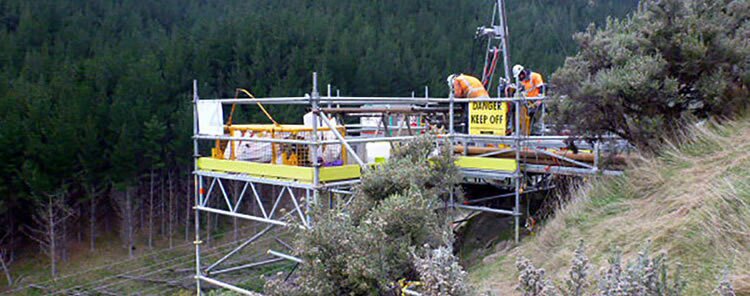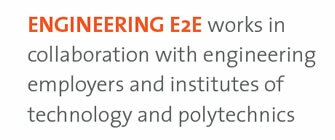INDUSTRY/EDUCATION LINKS CASE STUDY
Raising awareness of Temporary Works Engineering

The scaffolding industry is trying to raise awareness of its urgent need for temporary works engineers and careers in this field. Many students, graduates and even experienced engineers aren’t aware of the opportunities and demand in temporary works engineering.
An industry-wide shortage
Things should be looking good for the scaffolding industry, with lots of construction work underway and the prospect of more demand for scaffolding services in the future. However, a nationwide shortage of temporary works engineers is creating a problem for companies recruiting or employing engineers to sign off projects.
In response, the industry is trying to raise awareness of temporary works engineering and the opportunities available in this field. Some companies are looking at alternative solutions, such as taking on staff with a New Zealand Diploma in Engineering so that they only need a Chartered Professional Engineer (CPEng) for certain tasks.
Increased demand
The temporary works sector isn’t the only one experiencing this difficulty – other industries are also finding recruitment and retention of engineering staff a problem. However, the post-earthquake construction boom in Canterbury and increased demand for housing in Auckland means that more temporary works engineers are needed. There’s also the new health and safety framework to be introduced next year, which will no doubt increase the requirement for engineering oversight in temporary works projects such as scaffolding.
Industry response
The scaffolding industry is trying to raise awareness of its urgent need for temporary works engineers and careers in this field. Many students, graduates and even experienced engineers aren’t aware of the opportunities and demand in temporary works engineering.
Members of SARNZ (Scaffolding, Access & Rigging New Zealand) have met with IPENZ (Institution of Professional Engineers New Zealand) to highlight the problem, and have also raised it with the Construction Industry Council.
SARNZ website
IPENZ website

Employing NZDE-qualified engineers
WorkZone Scaffolds, a small company employing 25-30 people, recently took on a New Zealand Diploma in Engineering (NZDE) cadet for the first time. Managing Director Graham Burke says it has been a successful move for both the student and the company. “I could see how much benefit my company would get with that in-house capability. He uses AutoCAD and other programs, does calculations on loads, interprets the loading code, works out quotes, runs jobs and does other management tasks.” He adds that while the company will still require the services of a CPEng at times, having a NZDE-qualified engineer means that certain engineering tasks can be completed by in-house staff.
Graham notes that the NZDE/NZDEP (New Zealand Diploma in Engineering Practice) pathways are not well recognised or publicised. “If they knew about the qualification and the opportunities available, a lot more students might take that route. The old New Zealand Certificate in Engineering disappeared for a number of years and New Zealand suffered as a result, so it’s good to see its replacement running successfully.”
WorkZone Scaffold’s cadet Kurt Simpson has just completed the NZDE and plans to go on and study towards the NZDEP and possibly a Bachelor of Engineering Technology. He says that working in the temporary works sector made studying subjects such as Structures a lot easier, and that he was exposed to a wider range of tasks than in a consultancy.
“I’ve gained a large amount of practical experience in comparison with other students in my course. I plan to continue in the temporary works industry because there will be plenty of demand in the future.”
Opportunities

People involved in the scaffolding industry emphasise the future opportunities. Nick Pfahlert, Managing Director Upright Scaffolding and SARNZ president, says it’s important to make people aware of the growing demand for temporary works engineers. His Christchurch-based company employs 50 people and particularly needs engineers for jobs involving containment sheeting (heavy-duty sheeting for weatherproofing or containing dust and debris).
“Containment sheeting has been in wide use in the North Island and is now a key area of growth in the South Island, with particular demand in Christchurch. Worksafe New Zealand highlighted this as a risk area so, depending upon the outcome of the current review of Best Practice Guidelines, we are likely to need CPEngs for that.”
See Worksafe New Zealand's Best Practice Guideline for Scaffolding (Revised 2009)
With scaffolding businesses in a boom period and the consequent demand for engineers, Graham points out that there is increased opportunity for engineering practices, especially small ones, to take on more temporary work projects. Nick adds that there is also an opportunity for engineers to take on students or graduates, to make them aware of the temporary works sector.
Anyone wanting to find out more about temporary works engineering can contact:
WorkZone Scaffolds
Upright Scaffolding
Our thanks to Graham Burke, Kurt Simpson and Nick Pfahlert for their time and advice. If you have any other questions, please get in touch: .
December 2014
 |
 |
 |
||
 |
||||
 |
||||
 |






